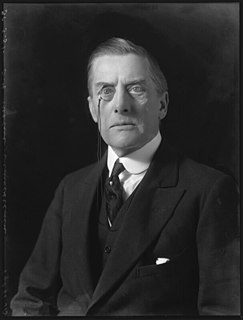A Quote by Benito Mussolini
Against individualism, the Fascist conception is for the State... Liberalism denied the State in the interests of the particular individual; Fascism reaffirms the State as the true reality of the individual.
Related Quotes
The Fascist conception of the State is all-embracing; outside of it no human or spiritual values can exist, much less have value. Thus understood, Fascism is totalitarian, and the Fascist State -- a synthesis and a unit inclusive of all values -- interprets, develops, and potentiates the whole life of a people.
The State, of course, is absolutely indispensable to the preservation of law and order, and the promotion of peace and social cooperation. What is unnecessary and evil, what abridges the liberty and threatens the true welfare of the individual, is the State that has usurped excessive powers and grown beyond its legitimate function - the super-State, the socialist State, the redistributive State, in brief, the ironically misnamed 'Welfare State.'
The basic principles of democracy should be observed whatever the country - principles such as civil liberties, a free market, a free press, the priority of the individual over mythical state interests, a state which serves the interests of ordinary people and defends their rights and interests. This is all easy to say but hard to make reality.
[I believe in] the throne...parliamentary institutions...private enterprise and individual opinion against the socialization of the state...equity in the distribution of public burdens and strict maintenance of public faith with the creditors of the state [and] a fresh guarantee of peace by an alliance with France and...Belgium for the defence of our common interests against unprovoked attack.
Citizens often think of a state's interests in terms of the promotion of ideals such as democracy, a particular way of life, or other values which they endorse or see as part of their historical continuity and identity. In this domain as in others values are not fixed, and so a state's interests are dynamic and in a constant state of negotiation and construction.
If it comes to a question of law, the charges they brought against me - the Espionage Act - is called the quintessential political crime. A political crime, in legal terms, is defined as any crime against a state, as opposed to against an individual. Assassination, for example, is not a political crime because you've killed a person, an individual, and they've been harmed; their family's been harmed. But the state itself, you can't be extradited for harming it.
There is the great, silent, continuous struggle: the struggle between the State and the Individual; between the State which demands and the individual who attempts to evade such demands. Because the individual, left to himself, unless he be a saint or hero, always refuses to pay taxes, obey laws, or go to war.




























